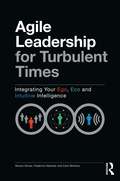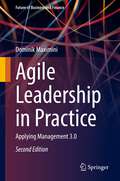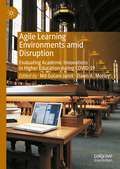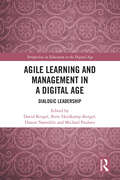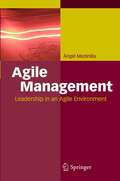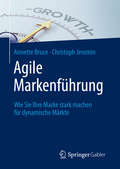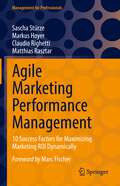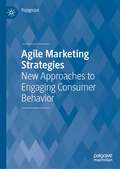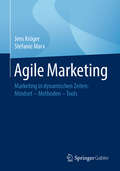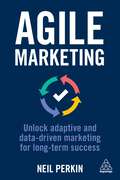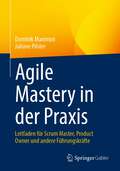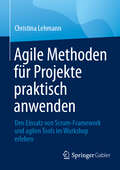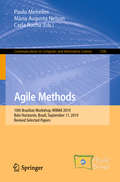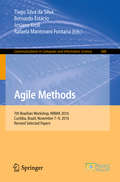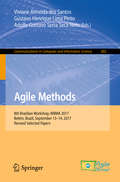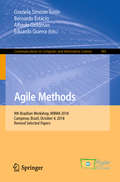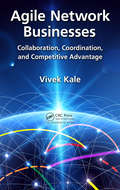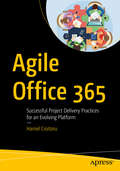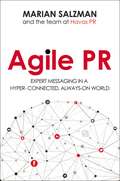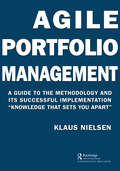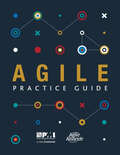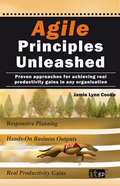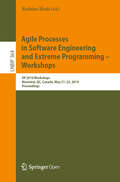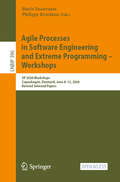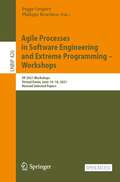- Table View
- List View
Agile Leadership for Turbulent Times: Integrating Your Ego, Eco and Intuitive Intelligence
by Colin Williams Sharon Olivier Frederick HölscherThis thought-provoking and engaging book is for you, whatever your seniority, in the private or public sector – if you are curious about the role and purpose of leadership in a turbulent world. It will help you become a more agile leader through understanding and integrating your ego, eco and intuitive intelligence. You will gain a deeper understanding of your unique leadership blend through a short diagnostic inventory, bringing insight about your strengths and what may be tripping you up. The book offers tips, ideas and practical suggestions on how to develop your ability to use the three intelligences in order to expand your leadership repertoire. It will help you enable the teams you lead to be more flexible, responsive and autonomous. The authors have drawn on their vast experience from the boardroom to the shop floor, the classroom and research around the world, to write an easy-to-digest yet ground-breaking book that deals with the root causes of today’s twenty-first-century leadership challenges. Its contents are straightforward and widely applicable.
Agile Leadership in Practice: Applying Management 3.0 (Future of Business and Finance)
by Dominik MaximiniThis book illustrates the agile transformation journey of a consulting organization. It consists of nine main chapters, each focusing on specific aspects of transformation. These include establishing value in business, holistic recruitment and retention, innovating performance appraisals, rethinking organizational structure, redesigning leadership roles, streamlining measurement and reward systems, and improving career paths. Some specific processes, such as corporate decision making, SMILE (budget for business improvement at employee discretion), project selection, holiday leave, and career coaching are also described. All of the transformations described build up on Management 3.0, a collection of management principles and practices that fit perfectly in an agile world.The book is of practical relevance for managers and agile coaches who want to learn how to approach agile transformation.
Agile Learning Environments amid Disruption: Evaluating Academic Innovations in Higher Education during COVID-19
by Dawn A. Morley Md Golam JamilThis edited collection addresses the need of evaluating innovative or non-traditional academic schemes for understanding their feasibility in extraordinary educational environments. The individual chapters are enriched with robust appraisals of policies and practices linked to academic innovations in higher education during the unprecedented COVID-19 pandemic. The case studies report wide-ranging teaching, learning and academic support practices within online, open, blended and distance learning models. The findings supply two domains of scholarship: evidence-based scenarios through real-world case studies, and a critical evaluation of educational quality through research-informed argument. The evidence gathered from countries, such as Australia, Bangladesh, Canada, China, India, Malaysia, Nepal, Saudi Arabia, Thailand, and the UK show empowering and deterring elements of academic innovation amid disruptions. Although this book highlights academic innovations in disruptive situations, they emerge as powerful tools and approaches to be considered in traditional face to face learning.
Agile Learning and Management in a Digital Age: Dialogic Leadership (Perspectives on Education in the Digital Age)
by David Kergel Birte Heidkamp-Kergel Hanne Nørreklit Michael PaulsenThis book offers a detailed theoretical analysis of the fields of learning and management in the digital age. Taking an interdisciplinary approach, it opens a dialogue between agile management theory and agile learning theory. The book argues that there is a tension between participative and action-orientated approaches on the one hand and neoliberal enclosure of the actor on the other hand. It takes this as an opportunity for interdisciplinary dialogue between learning theories and management concepts. With contributions from a range of international experts, chapters discuss the need for suitable theoretical, epistemological, and ethical foundations as well as practice-orientated methods for learning and management to implement appropriate strategies and meet educational challenges. This highly topical book will be of great interest to academics, postgraduate students, and researchers in the fields of digital learning, educational theory, management theory, and communication studies.
Agile Management: Leadership in an Agile Environment
by Ángel MedinillaIf you have tried to implement Agile in your organization, you have probably learned a lot about development practices, teamwork, processes and tools, but too little about how to manage such an organization. Yet managerial support is often the biggest impediment to successfully adopting Agile, and limiting your Agile efforts to those of the development teams while doing the same old-style management will dramatically limit the ability of your organization to reach the next Agile level. Ángel Medinilla will provide you with a comprehensive understanding of what Agile means to an organization and the manager's role in such an environment, i.e., how to manage, lead and motivate self-organizing teams and how to create an Agile corporate culture. Based on his background as a "veteran" Agile consultant for companies of all sizes, he delivers insights and experiences, points out possible pitfalls, presents practical approaches and possible scenarios, also including detailed suggestions for further reading. If you are a manager, team leader, evangelist, change agent (or whatever nice title) and if you want to push Agile further in your organization, then this is your book. You will read how to change the paradigm of what management is about: it is not about arbitrary decisions, constant supervision and progress control, and the negotiation of changing requirements. It is about motivation, self-organization, responsibility, and the exploitation of all project stakeholders' knowledge. We live in a different world than the one that most management experts of the 20th century describe, and companies that strive for success and excellence will need a new kind of manager - Agile managers.
Agile Markenführung: Wie Sie Ihre Marke stark machen für dynamische Märkte
by Annette Bruce Christoph JerominDieses Buch zeigt, wie eine agile Markenführung in dynamischen Märkten gelingen kann. Die digitale Welt zwingt Unternehmen dazu, die reine Stabilitäts- und Kontinuitätsfunktion der Markenpositionierung um Freiräume für Agilität und Anpassungsfähigkeit zu erweitern. Die Autoren stellen sehr anschaulich die Erfolgsfaktoren des agilen Marken-Managements vor, um den geforderten Paradigmenwechsel meistern zu können. Jeder der Erfolgsfaktoren wird mit einer ausführlichen Handlungsempfehlung verbunden, die der Leser für seine Berufs- und Managementpraxis nutzen kann. Die gesamte Argumentation wird dabei von Praxisbeispielen illustriert und unterstützt. Volatilität und Unsicherheit sind zwei Begriffe, die in der aktuellen wirtschaftlichen Diskussion von großer Bedeutung sind. Das Marketing ist durch die Veränderungen auf technologischer, kommunikativer und gesellschaftlicher Ebene besonders stark betroffen. Das Konsumentenverhalten, die Wettbewerbs-Situation und die veränderte Medien- und Vertriebslandschaft haben das unternehmerische Aktionsfeld komplett verändert. Die über Jahrzehnte bewährten Techniken und Prinzipien der Markenführung und -positionierung müssen deutlich weiter entwickelt werden.
Agile Marketing Performance Management: 10 Success Factors for Maximizing Marketing ROI Dynamically (Management for Professionals)
by Sascha Stürze Markus Hoyer Claudio Righetti Matthias RasztarThis book helps marketing decision makers in allocating their budget to diverse communication channels and different business units in an ROI-optimal way, and to adapt it in an agile manner. The optimal allocation of resources in marketing is not very complex in theory, but in practice a variety of questions arise, for example: How do you find the optimal mix, even across brands and product lines, and how do you adjust it dynamically? What is the right balance between image and performance marketing? How do you tackle strategic data management and other organizational challenges?The authors guide the reader through the entire process from data collection to marketing mix modeling and campaign tracking to tool selection. The book strikes the right balance between theoretical sophistication and necessary pragmatism, with numerous concrete recommendations for decision makers.
Agile Marketing Strategies: New Approaches to Engaging Consumer Behavior
by RajagopalThis book discusses the analysis of consumer behavior as a fundamental tool to build agility in business models and strategies. Exploring recent scientific developments in neurobehavioral research, this book argues that the development of agile marketing strategies requires an examination of neurobehavioral experiences in visual merchandising, shopping, and consumption, and an understanding cognitive synchronization with emotions, such as eye movements, gestures, verbal manifestation, and encoding behavior among consumers. The author discusses possible approaches to measure neuro-responses during a consumer’s shopping experience, both in-store and online. Such approaches will help firms to understand real-time neurobehavioral effects and improve the marketing capabilities of the firm accordingly.Discussing new strategies suitable to co-create agile business models in association with the market players and consumers, this interdisciplinary work engages scholarship on business agility, consumer behavior, social intervention, collective intelligence, decision-making, and stakeholder values.
Agile Marketing: Marketing in dynamischen Zeiten: Mindset – Methoden – Tools
by Jens Kröger Stefanie MarxDieses Buch vermittelt einen umfassenden Überblick zu relevanten Basics, Methoden und Tools, wie Sie Ihre Marketingarbeit und -teams durch Agilität erfolgreich und effizient aufstellen können.Agilität – hinter diesem Begriff verbirgt sich mehr als nur Spontaneität und Flexibilität. Es geht vor allem um ein Mindset, radikal kundenzentrierte Kommunikation, eine bewegliche Aufbauorganisation, um crossfunktionales Arbeiten über Abteilungsgrenzen hinweg sowie um permanente Erfolgsmessung und Anpassung. Bei erfolgreicher Umsetzung kann damit eine wegweisende und starke Rolle der Marketingabteilung im Gesamtunternehmen erreicht werden.Die Autoren geben Ihnen konkrete Ansätze, wie Sie sich im Marketingalltag agil aufstellen können. Am Ende des Buches werden Sie wissen, was Agile Marketing ist, welche agilen Methoden Sie dabei unterstützen können, wie sich die Team-Organisation und die Zusammenarbeit ändern wird und wie Sie durch Customer Centricity den zentralen Erfolgs- und Anerkennungsfaktor für Ihr Marketingteam schaffen.Aus dem Inhalt Wieso Agile Marketing eine geeignete Antwort auf dynamische Zeiten istWas verbirgt sich hinter dem Begriff „Agile Marketing“ Was ist ein Agile Mindset und wie kann es entwickelt werdenWerte und Prinzipien für erfolgreiches Agile MarketingMit diesen Methoden und Tools können Sie Ihr Marketing agil aufstellenEine pragmatische Starthilfe für Ihren Weg zum Agile MarketingVerankerung der Fachabteilung in der OrganisationDie „neue“ Rolle des CMOs und des Fachbereichs
Agile Marketing: Unlock Adaptive and Data-driven Marketing for Long-term Success
by Neil PerkinCreate and apply responsive and adaptive marketing principles and practices with this guide to redesigning marketing structures, processes and culture, to be fit for purpose in today's changeable environment. Agile Marketing is an essential and practical roadmap to transforming your marketing by applying agile principles at scale and overcoming mindset and culture challenges to enable greater efficiency and quicker response times. Covering areas such as putting data and automation at the centre of agility, measuring success and creating and maintaining space for innovation, it features a range of invaluable frameworks, practical guidance and insightful examples from organizations such as Dell and Pepsi. Written by a recognized agile expert and marketing thought-leader who has worked with marketing teams in some of the largest global organizations, Agile Marketing also explores how to empower high-performing marketing teams and develop and pivot agile campaigns and content. Featuring tips and tools throughout and a step-by-step agile marketing transformation blueprint, it is a crucial resource for creating effective and streamlined marketing today and into the future.
Agile Mastery in der Praxis: Leitfaden für Scrum Master, Product Owner und andere Führungskräfte
by Dominik Maximini Juliane PilsterUngefähr 94% aller Unternehmen setzen heute bereits agile Methoden ein. Das ist kaum verwunderlich, denn Agilität kann die Performance eines Unternehmens erheblich verbessern und nur Unternehmen, die agil aufgestellt sind, werden dem Veränderungsdruck des 21. Jahrhunderts standhalten können. Getragen wird eine agile Kultur durch die Menschen, die sie leben, also zum Beispiel Scrum Master, Kanban Master, Agile Coaches, Release Train Engineers, agile Projektleiter und disziplinarische Führungskräfte oder People Leads. Diese Personen müssen zu Agile Mastern werden, um ihre Aufgaben herausragend erfüllen zu können.Agile Master zu sein bedeutet, Agilität zu leben, die richtigen Methoden einzusetzen und dabei eine agile Haltung einzunehmen. Dieses Buch vermittelt entlang der "Pyramide der Impediments" eine Vielzahl von Methoden zur Schaffung von Transparenz, Inspektion und Adaption. Dabei erklären die Autoren nicht nur die Methoden praxisnah, sondern illustrieren auch die benötigte Haltung und erläutern häufige Fallstricke. Dieses Buch ist Dein ständiger Begleiter im agilen Praxisalltag!
Agile Methoden für Projekte praktisch anwenden: Den Einsatz von Scrum-Framework und agilen Tools im Workshop erleben
by Christina LehmannEs gibt eine Vielzahl an Kursen und Weiterbildungsmöglichkeiten, um das Framework Scrum kennenzulernen, sich mit agilen Methoden theoretisch auseinanderzusetzen und sich erworbenes Wissen zertifizieren zu lassen. Um die erlernten Methoden und Werkzeuge lösungsorientiert praktisch auch anwenden zu können, müssen sie ausprobiert werden, damit über das Wissen hinaus nachhaltige Kompetenz entwickelt werden kann. Das Erlernte prägt sich besser ein und durch die konkrete Anwendung wird klar, wie spezifische Werkzeuge, die ansonsten abstrakte Begriffe bleiben würden, zur Lösung konkreter Probleme in Projekten eingesetzt werden können. In diesem Buch werden die Konzeption und Durchführung eines Workshops zum Framework Scrum dargestellt, um das theoretische Vorwissen mit der praktischen Anwendung zu verknüpfen. Dieses Buch richtet sich an alle, die die Einführung agiler Arbeitsweisen im Unternehmen planen, Mitarbeiter für das Framework Scrum begeistern möchten und erste Umsetzungserfolge erzielen wollen. Für diejenige, die sich mit der erfolgreichen Durchführung von Projekten befassen, sich mit Scrum bereits beschäftigt haben, aber bisher noch keine praktischen Erfahrungen sammeln konnten, dient dieses Buch als Inspiration, um einmal andere Lernwege in diesem Kontext zu versuchen. Der erste Teil des Werkes stellt das relevante Grundlagenwissen zusammen. Im zweiten Teil werden die notwendigen Vorbereitungen beschrieben, die den reibungslosen Einsatz der vorgestellten Werkzeuge und Methoden im Workshop sicherstellen sollen. Der dritte Teil befasst sich mit der Durchführung des Workshops und seiner konkreten Ablaufstruktur. Es wird Schritt für Schritt der Tool- und Methodeneinsatz für die konkrete Projektaufgabe erläutert und auf die wesentlichen Learnings jeder Etappe hingewiesen.
Agile Methods: 10th Brazilian Workshop, WBMA 2019, Belo Horizonte, Brazil, September 11, 2019, Revised Selected Papers (Communications in Computer and Information Science #1106)
by Paulo Meirelles Maria Augusta Nelson Carla RochaThis book constitutes revised selected papers from the 10th Brazilian Workshop on Agile Methods, WBMA 2019, held in Belo Horizonte, Brazil, in September 2019. The 6 full and 4 short papers presented in this volume were carefully reviewed and selected from 21 submissions.Accepted papers focus on agile methods; experimental studies with agile; software engineering education with agile; agile project management.
Agile Methods: 7th Brazilian Workshop, WBMA 2016, Curitiba, Brazil, November 7-9, 2016, Revised Selected Papers (Communications in Computer and Information Science #680)
by Tiago Silva da Silva Bernardo Estácio Josiane Kroll Rafaela Mantovani FontanaThis book constitutes revised selected papers from the 7th Brazilian Workshop on Agil Methods, WBMA 2016, held in Curitiba, Brazil, in November 2016. The 10 full and 4 short papers presented in this volume were carefully reviewed and selected from 35 submissions. The papers present empirical results and literature reviews on agile implementation in government and distributed environments, design thinking and projects inception, testing and technical debt, motivation and gamification, training, modeling and project management, maturity models and quality assurance.
Agile Methods: 8th Brazilian Workshop, WBMA 2017, Belém, Brazil, September 13–14, 2017, Revised Selected Papers (Communications in Computer and Information Science #802)
by Viviane Almeida dos Santos Gustavo Henrique Lima Pinto Adolfo Gustavo Serra Seca NetoThis book constitutes revised selected papers from the 8th Brazilian Workshop on Agile Methods, WBMA 2017, held in Bel#65533;m, Brazil, in September 2017. The 10 full and 2 short papers presented in this volume were carefully reviewed and selected from 19 submissions. The papers present empirical studies on agile values and principles; agile practices; agile adoption; agile testing and quality; metrics; conceptual studies; cultural aspects on agile business; organizational transformation and future trends.
Agile Methods: 9th Brazilian Workshop, WBMA 2018, Campinas, Brazil, October 4, 2018, Revised Selected Papers (Communications in Computer and Information Science #981)
by Bernardo Estácio Graziela Simone Tonin Alfredo Goldman Eduardo GuerraThis book constitutes revised selected papers from the 9th Brazilian Workshop on Agile Methods, WBMA 2018, held in Campinas, Brazil, in October 2018. The 6 full and 1 short papers presented in this volume were carefully reviewed and selected from 18 submissions. Accepted papers in this edition present empirical results and literature reviews on agile requirements validation in Brazilian software development companies; a survey on Brazilian software processes about to be agile or not; an evaluation of an agile maturity model; strategies to increase customer value in agile software development; an agile development environment and scrum in a strongly hierarchical organization.
Agile Network Businesses: Collaboration, Coordination, and Competitive Advantage
by Vivek Kale"A highly readable and yet comprehensive book on network businesses that have become governable with the advent of cloud and big data computing. Vivek Kale is a master of simplifying the complex world of network theory and its relevance to business."—Jagdish N. Sheth, Charles H. Kellstadt Professor of Marketing, Emory University Agile Network Businesses: Collaboration, Coordination, and Competitive Advantage reflects the shift from traditional networks to virtual and agile networks that enable businesses to operate dynamically, thereby representing markets more closely. This book enables IT managers and business decision-makers to understand clearly what network businesses and enterprises are, what they can do for them, and how to realize them. Customers in geographically dispersed markets are demanding higher quality products in a greater variety, at lower cost, and in a shorter time. Thus, enterprises have moved from a few centralized and vertically integrated facilities to geographically dispersed networks of capabilities, competencies and resources, which are the core of network businesses. Enterprises are now constructing more fluid network businesses in which each member facility focuses on differentiation and relies increasingly on its partners, suppliers, and customers to provide the rest. Network businesses have emerged as an organizational paradigm for collaboration and coordination across loosely connected individual organizations. This pragmatic book: Introduces network solutions and distributed systems that are a first step towards enabling a network enterprise. It also gives a detailed description of networks and agent system that have paved the road to network enterprises. Describes the basics of service-oriented architecture (SOA), cloud computing, and big data that are essential to network enterprises. Details the distinguishing aspects of network enterprises, which include virtual enterprises, management of network enterprises, and collaborative network enterprises. Covers such major application areas as supply, manufacturing, e-business, platform, social and wireless sensor networks. Introduces decision networks in the context of supply chain networks This book reinterprets the traditional supply chain in terms of the flow of decisions, information, and materials, which leads to reconfiguring the traditional supply chain network into mutually separate decision networks (e.g., fourth-party logistics or 4PL), information networks (e.g., wireless sensor networks), and logistics networks (e.g., third-party logistics or 3PL).
Agile Office 365: Successful Project Delivery Practices for an Evolving Platform
by Haniel CroitoruPlan, deploy, and run Office 365 using an agile project management approach. This soup-to-nuts guide teaches you how to apply agile techniques in order to make your Office 365 implementation a success, even as the Microsoft Office 365 platform continues to evolve and introduce new features.The author's approach to teaching time- and resource-saving concepts mirrors the process a team might typically encounter in delivering software projects. Learning begins with an overview of Office 365 and Agile. From there, you delve into topics correlating to product conception, execution, and deployment. The book wraps up with a comprehensive discussion on how Office 365, straight out of the box, can be used as a tool to manage Office 365 deployments and other types of projects.What You'll LearnUnderstand what Office 365 is and why it is the world’s most popular online business appAdapt your delivery process to work with Office 365 and its regular update scheduleRecognize potential risk areas and develop mitigation strategiesDiscover the tools that are available to make your life easierManage the transition from deployment to operationsFollow end-to-end guidance packed with useful case studies and tools to make your job easierWho This Book Is ForProject managers, business analysts, IT managers, and other team members involved in managing Office 365 in order to deliver solutions for their organization. While not required, a basic understanding of Agile methodologies and Office 365 is useful.
Agile PR: Expert Messaging in a Hyper-Connected, Always-On World
by Marian Salzman THE TEAM AT HAVAS PRBloggers, influencers, citizen journalists...today's news landscape is crowded and constantly changing. As a PR professional, how do you match your message to the medium and ensure that it gets heard above the noise?Public relations maverick Marian Salzman goes behind the scenes of creative power house Havas PR, revealing the newest, most effective tactics for championing brands, organizations, and causes. Punctuated by case studies from the United Nations Foundation, Wyclef Jean, Sears, and other campaigns, Agile PR reveals how to:Use newscrafting to help clients be the newsPersonalize pitches to reporters and bloggersMaster the art of storytellingBreak through Web clutterCreate branded hashtags that get sharedBump clients to the top of online searchesGain exposure at SXSW, TED, and other key conferencesAvert and resolve crisesMeasure the impact of media placementsAnd moreAmbitious media plans call for cutting-edge tools. Agile PR unlocks industry secrets sure to help anyone broaden their reach and increase their impact.
Agile Portfolio Management: A Guide to the Methodology and Its Successful Implementation “Knowledge That Sets You Apart”
by Klaus NielsenAgile portfolio management deals with how an organization identifies, prioritizes, organizes, and manages different products. This is done in a streamlined way in order to optimize the development of value in a manner that’s sustainable in the long run. It ensures that a company provides their clients with the best value for their investment. A good portfolio manager understands and follows the agile principles while also considering the various factors needed to successfully manage numerous teams and projects. The project management office of many organizations are faced with the reality of more and more agile deliverables as part of agile transformations, however they lack the knowledge to perform these tasks. Researchers and practitioners have a good understanding of project, program and portfolio management in a planned based perspective. They have common standards from Axelos, PMI and such, so they know the best practices. The knowledge of agile on a team level is fairly mature and the knowledge of more agile teams (scaling) are increasing. However, the knowledge of agile portfolio management is still limited. The aim of this book is to give the reader an understanding of portfolio management of a portfolio of agile deliverables, what the options are (theory), what we know (research) and what others are doing (practice). Many organizations in banking, insurance to name a few are in the middle of major agile transformations with limited knowledge of the practice. In this book, the author collects and analyzes common practices in varies industries. He provides both theory and through case studies the practical aspects of agile portfolio management.
Agile Practice Guide
by Project Management InstituteAgile Practice Guide – First Edition has been developed as a resource to understand, evaluate, and use agile and hybrid agile approaches. This practice guide provides guidance on when, where, and how to apply agile approaches and provides practical tools for practitioners and organizations wanting to increase agility. This practice guide is aligned with other PMI standards, including A Guide to the Project Management Body of Knowledge (PMBOK® Guide) – Sixth Edition, and was developed as the result of collaboration between the Project Management Institute and the Agile Alliance.
Agile Principles Unleashed
by Jamie Lynn CookeAgile Principles Unleashed: Proven approaches for achieving real productivity gains in any organisationAn essential tool for anyone whose job it is to deliver high quality results on time and to budget! Agile approaches are business practices with a proven track record for helping organisations achieve greater efficiency, higher quality outputs and increased customer satisfaction. They enable organisations to avoid the trappings of extensive up-front planning and up-front budget commitments by encouraging staff to regularly produce high quality business outputs; and by basing ongoing financial and resource commitments on the delivered outcomes. This focus on responsive planning based on tangible outputs is why Agile approaches have been successfully used in selected industries for over two decades. Agile Principles Unleashed: Proven approaches for achieving real productivity gains in any organisation introduces every industry sector to the Agile approaches that have dramatically improved the IT, product development and manufacturing sectors over the past two decades. The book clearly explains how the key principles of Agile approaches can be used to significantly increase productivity, quality and customer satisfaction in any organisation. Written in non-technical language specifically for business professionals, this book is an essential tool for anyone whose job it is to deliver high quality results on time and to budget. Benefits of introducing Agile . . . * Minimise waste If a project is heavily planned in advance, but its results are only tested after the work has been completed, then any flaw will be very expensive to put right. Instead, Agile approaches promote stakeholder engagement, and encourage feedback at successive stages of the development process. This means that problems can be detected earlier on, and put right at a much lower cost to the organisation. * Improve communication No matter how precise the blueprint, it is never going to be a substitute for the close co-operation between people of different skills that is required to bring a project to fruition. This book shows you how to achieve results that are aligned with business needs by keeping the technical team in close contact with the business area as the project progresses. * Empower the team Agile approaches allow a delivery team to determine the volume of work that they are capable of delivering within the individual phases of a project. In this way, delivery teams are given a sense of responsibility for completing the assignment within the timeframe they have set themselves, and feel motivated to deliver work of a quality that will continue to satisfy the stakeholders. * Meet deadlines Agile is designed to avoid the business risks involved in 'all-at-once' delivery, where a glitch during one stage of the project throws the entire effort out of kilter, and results in serious delays in completion. This book shows how you can accommodate inevitable internal and external changes through responsive planning. By following Agile principles, staff members no longer have to wait several weeks or months for an updated plan to be agreed, but can quickly adjust their working in line with the new priorities. In this way, Agile will help you to avoid project overrun and to make good your commitments. Over the past two decades, Agile approaches have had a revolutionary impact on software development in many small- and medium-sized IT companies, as well as big corporations like Microsoft, Yahoo! and Google. Thanks to their focus on responsive planning and tangible outputs, Agile approaches have also led to dramatic improvements in the product development and manufacturing sectors. Agile Principles Unleashed presents common-sense methods that will help your organisation to complete projects faster and to a higher standard.
Agile Processes in Software Engineering and Extreme Programming – Workshops: XP 2019 Workshops, Montréal, QC, Canada, May 21–25, 2019, Proceedings (Lecture Notes in Business Information Processing #364)
by Rashina HodaThis open access book constitutes the research workshops, doctoral symposium and panel summaries presented at the 20th International Conference on Agile Software Development, XP 2019, held in Montreal, QC, Canada, in May 2019.XP is the premier agile software development conference combining research and practice. It is a hybrid forum where agile researchers, academics, practitioners, thought leaders, coaches, and trainers get together to present and discuss their most recent innovations, research results, experiences, concerns, challenges, and trends. Following this history, for both researchers and seasoned practitioners XP 2019 provided an informal environment to network, share, and discover trends in Agile for the next 20 years. Research papers and talks submissions were invited for the three XP 2019 research workshops, namely, agile transformation, autonomous teams, and large scale agile. This book includes 15 related papers. In addition, a summary for each of the four panels at XP 2019 is included. The panels were on security and privacy; the impact of the agile manifesto on culture, education, and software practices; business agility – agile’s next frontier; and Agile – the next 20 years.
Agile Processes in Software Engineering and Extreme Programming – Workshops: XP 2020 Workshops, Copenhagen, Denmark, June 8–12, 2020, Revised Selected Papers (Lecture Notes in Business Information Processing #396)
by Philippe Kruchten Maria PaasivaaraThis open access book constitutes the 6 research workshops, the Agile Education and Training Track, the Doctoral Symposium, as well as a panel presented at XP 2020, the 21st International Conference on Agile Software Development, which was held during June 8-12, 2020. The conference was planned to take place at the IT University of Copenhagen, Denmark. Due to the COVID 19 pandemic, the conference was held online. In 2020, the following six workshops took place: Third International Workshop on Software-Intensive Business Eighth International Workshop on Large-Scale Agile Development Second European Symposium on Serverless Computing and Applications Second International Workshop on Agile Transformation First International Workshop on Agility with Microservices Programming Third International Workshop on Autonomous Agile Teams XP is the premier agile software development conference combining research and practice. It is a unique forum where agile researchers, practitioners, thought leaders, coaches, and trainers get together to present and discuss their most recent innovations, research results, experiences, concerns, challenges, and trends. XP conferences provide an informal environment to learn and trigger discussions and welcome both people new to agile and seasoned agile practitioners. The 31 papers presented in this volume were carefully reviewed and selected from overall 79 submissions. In addition to the 26 workshop papers, this volume also includes 2 papers from the Agile Education and Training Track and 3 papers from the Doctoral Symposium. Furthermore, the book contains a summary of a panel discussion with the topic “Covid-19’s Influence on the Future of Agile”.
Agile Processes in Software Engineering and Extreme Programming – Workshops: XP 2021 Workshops, Virtual Event, June 14–18, 2021, Revised Selected Papers (Lecture Notes in Business Information Processing #426)
by Peggy Gregory Philippe KruchtenThis open access book constitutes papers from the 5 research workshops, the poster presentations, as well as two panel discussions which were presented at XP 2021, the 22nd International Conference on Agile Software Development, which was held online during June 14-18, 2021. XP is the premier agile software development conference combining research and practice. It is a unique forum where agile researchers, practitioners, thought leaders, coaches, and trainers get together to present and discuss their most recent innovations, research results, experiences, concerns, challenges, and trends. XP conferences provide an informal environment to learn and trigger discussions and welcome both people new to agile and seasoned agile practitioners.The 18 papers included in this volume were carefully reviewed and selected from overall 37 submissions. They stem from the following workshops:3rd International Workshop on Agile Transformation9th International Workshop on Large-Scale Agile Development1st International Workshop on Agile Sustainability4th International Workshop on Software-Intensive Business2nd International Workshop on Agility with Microservices Programming
